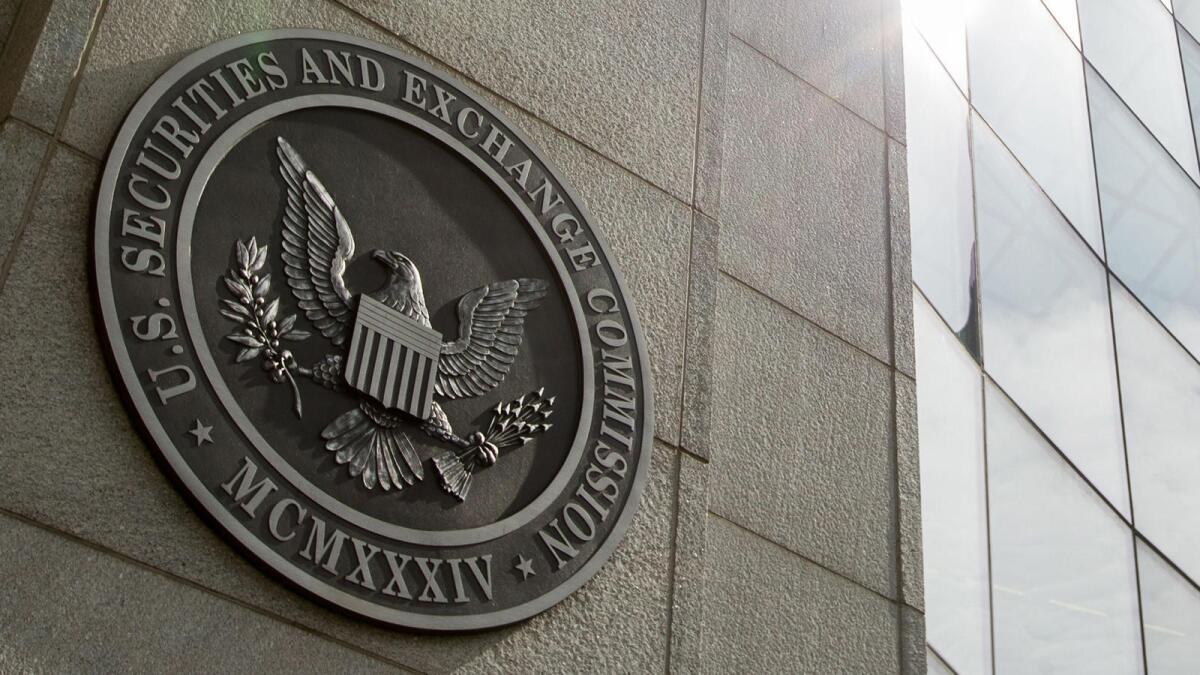Trump’s nominee for SEC chief reveals possible conflicts of interest

- Share via
The Wall Street attorney chosen by President Trump to head the Securities and Exchange Commission has worked on many of the kinds of deals the agency regulates and represented some of the biggest financial firms.
A financial disclosure report Jay Clayton filed with the government reveals clients that pose potential conflicts of interest for the SEC job. They include Wall Street powerhouses Goldman Sachs, Deutsche Bank, Barclays and UBS. He may have to recuse himself from some cases to come before the agency.
Trump nominated Clayton, a partner in the prominent law firm Sullivan & Cromwell, to be chairman of the independent agency that oversees Wall Street and the financial markets. If confirmed by the Senate, Clayton’s responsibilities will include enforcing SEC rules written under the 2010 law that reshaped financial regulation after the 2008-09 financial crisis and Great Recession. Clayton also would participate in decisions on enforcement actions that SEC attorneys bring against financial firms and corporations.
Clayton has vast legal experience in corporate mergers and public stock launches, as well as representing big financial firms and other corporations.
Some of his biggest cases came in the panicky days of 2008: Clayton represented Goldman in billionaire Warren Buffett’s $5-billion investment in the bank, and the teetering Bear Stearns in its rescue sale to JPMorgan Chase. He worked on many deals bringing companies public, notably the 2014 U.S. stock market debut of Chinese e-commerce giant Alibaba — the biggest IPO ever.
Clayton’s financial disclosure filing shows other big corporate clients including Ally Financial, Royal Bank of Canada, Volkswagen, British Airways, Priceline Group and Valeant Pharmaceuticals. Valeant, a Canadian drugmaker, is the target of at least 10 government investigations, including a congressional probe into high drug prices.
Two of the biggest hedge funds — activist investor Bill Ackman’s Pershing Square and Paul Tudor Jones’s Tudor Investment Corp. — are among Clayton’s clients.
Two additional corporate clients weren’t disclosed because they’re the subject of “non-public” investigations, according to Clayton’s form.
Clayton is among a number of Trump choices for top government positions who have preexisting Wall Street connections. Treasury Secretary Steven Mnuchin is a former Goldman executive, leading economic advisor Gary Cohn was until recently Goldman’s president, and Commerce Department chief Wilbur Ross is a billionaire investor.
Clayton’s wife, Gretchen Clayton, works at Goldman as a financial advisor.
The filing shows they have assets of between $10 million and $47 million, spread over an array of investment funds and some stocks.
Clayton reported earning about $7.6 million as his partnership share in the law firm for 2016-17. He also expects to receive between $500,000 and $1 million if he is confirmed.
He is slated to go before the Senate Banking Committee for his confirmation hearing this month. Some Democrats probably will question his connections and whether he would be able to act as a strong regulator of Wall Street. But, with a Republican majority in the Senate, his confirmation is assured.
Clayton would succeed Mary Jo White, a former federal prosecutor who also had worked as a corporate attorney before being named SEC chair by President Obama. Because of her client list, she had to remove herself from deciding on cases affecting several companies.
Trump also will be able to name two other members to the five-member SEC.
The SEC under Clayton, with an eventual Republican majority among its five members, is expected to roll back or soften at least some of the rules that the agency put in under the 2010 financial oversight law. That would be in line with Trump’s tilt toward easing government regulation of business.
The law, known as Dodd-Frank, was enacted by Democratic lawmakers and signed by Obama. It has long been scorned by Republicans. Last month, Trump launched his long-promised attack on the banking rules that flowed from the law, ordering his Treasury secretary to review the regulations and pledging further action to free banks from restrictions.
More to Read
Inside the business of entertainment
The Wide Shot brings you news, analysis and insights on everything from streaming wars to production — and what it all means for the future.
You may occasionally receive promotional content from the Los Angeles Times.










